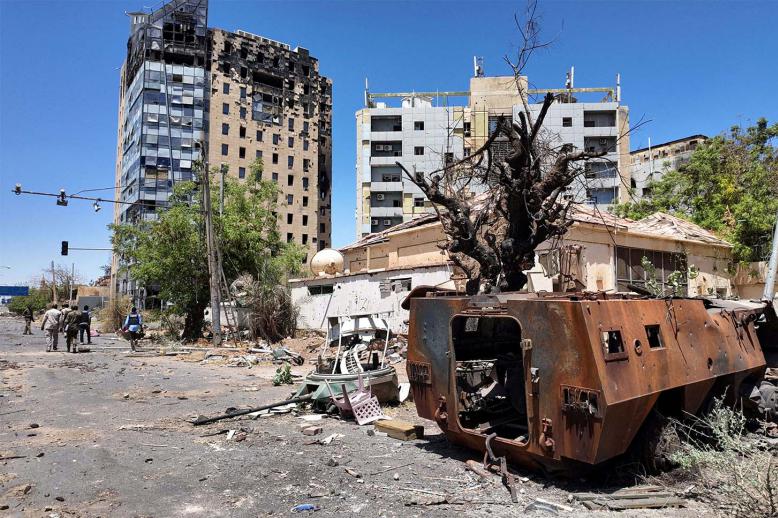Intolerance in Europe is destroying trust in Mediterranean region
Nothing illustrates the rising intolerance on immigration, be it legal or illegal, in Europe better than the violent riots in the eastern German town of Chemnitz and the political panic attack that characterises the run-up to the elections in Sweden.
Whatever the cause of the riots in Chemnitz, the sight of mobs hunting foreigners through the streets is uncomfortably reminiscent of civil war and Nazi pogroms. Security experts said there was evidence rioters had been mobilised from groups around the country and elsewhere in Europe.
The violence in Swedish cities is the prelude to the September 9 general election, which has been fought amid bitter debates about immigration, integration, crime and populism.
The Sweden Democrats, a party that was for years regarded as a sinister group of far-right cranks, looks like it may end up with more votes than the traditionally conservative and socialist parties. The party no longer hides its nastiness. Its representatives can be caught voicing the most egregious opinions. People will vote for them anyway.
It was the refugee crisis in Sweden, as in Germany, that gave the populist right a boost. Three years ago, Sweden had 162,000 people applying for asylum, 35,000 of whom were unaccompanied children. The government aimed to make Sweden a “humanitarian superpower” and no other party objected to this open-door policy. The aim backfired in spectacular fashion.
Paradoxically, figures from the National Council for Crime Prevention show a steady decline in many crimes — physical assaults and car theft. The offences on the rise, however, are spectacular — burned-out cars and organised crime. Murder is up 40% since 2012; the number of homicides has more than doubled in ten years and it is five times more common for a young man in Sweden to be shot and killed than in Britain.
Not all of this is attributable to immigrants but the novelty of schools and carts being torched has set Sweden on fire politically. The naivety of traditional political parties, not least on the left, is breathtaking.
It is worth noting too that many Swedes say their country is moving in the wrong direction. Income inequality has been since the mid-1980s growing faster in Sweden than in any other member of the Organisation for Economic Co-operation and Development.
The growing income gap can be traced to reforms in the 1990s that reduced the tax burden on the wealthiest citizens. Since the financial crisis, the proportion of Swedes at risk of poverty — defined as having a disposable income less than 60% of the national medium — has been growing at one of the fastest rates in the European Union.
The risk of falling into poverty depends on where you were born. While 13% of Swedish-born residents were at risk of poverty in 2016, the same was true for one-third of those born abroad, the Confederation of Swedish Enterprise stated.
The rising prevalence of economically marginalised residents born abroad has coincided with a steady growth in immigration. In 2017, the country issued more than three times as many residency permits as in 1998, figures from the Swedish Migrant Agency indicate. The number was down from the year before when the country was processing asylum applications from 163,000 people who went to the country of 10 million in 2015.
The challenge of labour integration is tough. A growing number of people born abroad work in Sweden. In the eight years to 2016, 214,000 jobs were created and the majority were filled by people born abroad, data from Statistics Sweden indicate.
Over the same period, the number of people of working age born in Sweden decreased by 166,000 while the figure for those born abroad rose by 400,000. The number of unemployed people born in Sweden has been in steady decline since the financial crisis but the number of unemployed migrants has risen. The same data indicate that the growth in the proportion of migrants without secondary education is the reason for the trend. Integrating those with a low level of education remains a huge challenge. The education gap between those born in Sweden and those born abroad is growing.
All of which helps explain why Swedes are split over their view of the country. The Novus survey revealed that optimism for the future runs along political affiliation; 62% of those intending to vote for a party on the left said their country was moving in the right direction and 92% of supporters of the anti-immigration Sweden Democrats said the opposite.
One feature that has been recently highlighted in Germany but applies to Sweden and, more broadly across the continent, is the manner in which populist talk shows fuel the rise of the far right.
The managing director of Germany’s most powerful cultural body, the German Cultural Council, Olaf Zimmermann, has called for the plug to be pulled on the nation’s multitude of political talk shows for a year. Public broadcasters need to rethink a format that has helped cement gloom-ridden public attitudes towards refugees and Islam and propelled the right-wing Alternative for Germany party into parliament.
What is true in Germany is true, with varying degrees, across Europe, where think-tanks obsess about radical Islam and terrorism but have quite forgotten that major EU powers, in alliance with the United States, have, by destroying Iraq and pushing through inept policies in Libya and Afghanistan, helped fuel the wave of populism that is destroying trust between countries in the Mediterranean region.
Francis Ghiles is an associate fellow at the Barcelona Centre for International Affairs.
This article was originally published in The Arab Weekly.







